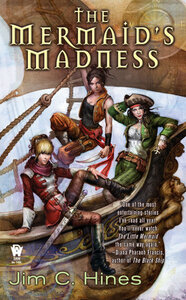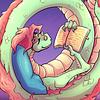Take a photo of a barcode or cover
adventurous
challenging
dark
emotional
funny
lighthearted
medium-paced
Plot or Character Driven:
Plot
Strong character development:
Yes
Loveable characters:
Yes
Diverse cast of characters:
Yes
Flaws of characters a main focus:
Complicated
After getting about 20% into the book, I was curious about something so I read a couple of reviews for this book... and that was a mistake. I came across something (else) further into the book that turned me off of continuing to read it, and so I'm going to DNF until such a time as I forget that spoiler and decide to pick it up again. Sigh.
This one is so so so so good!!! Loved it almost as much, if not more than the first! Amazing series so far! Excited to start Red Hood’s Revenge as soon as it comes in the mail. Highly recommend!
My initial reaction to The Mermaid's Madness was that it wasn't as fun as the first book, probably because the novelty might have worn off, but also because the main emotional conflict in the story happens on a character we barely spend any time with. And I definitely agree with the latter statement, but not the first. This book is the weakest of the three I've read so far, simply because none of our three ladies have any true personal stakes in what's going on. There is absolutely no novelty at work in the next book in the series, and it's by far the best.
The plot is in the title with this one, as Hines does his take on "The Little Mermaid," drawing as his main inspiration the original Hans Christian Andersen tale, although Hines' version is significantly darker than the original, which is saying something, because that story is already about a girl who falls in love with a man who lives in a world she can never be part of, and after sacrificing her voice both literally and figuratively, and enduring great pain to be with him, ends up killing herself to save him despite that he dumps her for some other asshole. And wooohooo she's rewarded with a soul! Except that's balls. All of those elements are present in this book, but they're twisted just enough so you can't see what's coming around the next narrative bend.
Anyway, so Hines' little mermaid, Lirea (an anagram for Ariel, doncha know) opens the book by attacking Queen Beatrice, who is the princesses' protector and mentor, so they go all out in trying to track the foul merbeast down and save the life of their queen. It's a lot more complicated than that, but spoilers, so oh well.
I found the story intellectually interesting, and Hines' version of the Little Mermaid story was sort of fun, if very sad also, but I found myself mostly emotionally disengaged from it. Books one, three and four (I assume--again, haven't read the last one yet) directly engage with each princess's backstory, and the emotional stakes are ridiculously high (especially in book three). I think this book would have been so much better if Hines had given more narrative POV time to the actual mermaid in the story, instead of having her sort of be a sideshow in her own story (which turns out to be very tragic). It's not that Hines takes away her agency, because I think mostly the distance we have from her is a function of preserving the twists and turns in the story, but that hers was the most interesting emotional journey in the book, and it's one we get almost nothing of. Of the three main princesses, Snow gets the meatiest storyline as the mermaid (here called undine) sea witch begins to teach her to hone her magical powers, but it's still not that significant compared to the other books. Snow, Talia and Danielle are also fighting to save Quean Bea, but it's more of a removed set of personal stakes, especially since we never believe for a second that Bea won't survive.
Anyway, I liked it, but it could have been better.
The plot is in the title with this one, as Hines does his take on "The Little Mermaid," drawing as his main inspiration the original Hans Christian Andersen tale, although Hines' version is significantly darker than the original, which is saying something, because that story is already about a girl who falls in love with a man who lives in a world she can never be part of, and after sacrificing her voice both literally and figuratively, and enduring great pain to be with him, ends up killing herself to save him despite that he dumps her for some other asshole. And wooohooo she's rewarded with a soul! Except that's balls. All of those elements are present in this book, but they're twisted just enough so you can't see what's coming around the next narrative bend.
Anyway, so Hines' little mermaid, Lirea (an anagram for Ariel, doncha know) opens the book by attacking Queen Beatrice, who is the princesses' protector and mentor, so they go all out in trying to track the foul merbeast down and save the life of their queen. It's a lot more complicated than that, but spoilers, so oh well.
I found the story intellectually interesting, and Hines' version of the Little Mermaid story was sort of fun, if very sad also, but I found myself mostly emotionally disengaged from it. Books one, three and four (I assume--again, haven't read the last one yet) directly engage with each princess's backstory, and the emotional stakes are ridiculously high (especially in book three). I think this book would have been so much better if Hines had given more narrative POV time to the actual mermaid in the story, instead of having her sort of be a sideshow in her own story (which turns out to be very tragic). It's not that Hines takes away her agency, because I think mostly the distance we have from her is a function of preserving the twists and turns in the story, but that hers was the most interesting emotional journey in the book, and it's one we get almost nothing of. Of the three main princesses, Snow gets the meatiest storyline as the mermaid (here called undine) sea witch begins to teach her to hone her magical powers, but it's still not that significant compared to the other books. Snow, Talia and Danielle are also fighting to save Quean Bea, but it's more of a removed set of personal stakes, especially since we never believe for a second that Bea won't survive.
Anyway, I liked it, but it could have been better.
medium-paced
Plot or Character Driven:
A mix
Strong character development:
No
Loveable characters:
No
Diverse cast of characters:
No
Flaws of characters a main focus:
No
I'm really enjoying this different take on the "fairy tale" princesses. Full of action, new twists, and better yet, complex, strong female characters who carry the story well and keep it interesting.
Excellent book. Hines successfully elaborates on the characterization of all three princesses while crafting a tale that is interesting, funny, and inspiring - but not mindlessly happy. These princesses make sacrifices, and everyone encounters pain and death. But the dark parts don't rule the book; rather, they serve to accentuate the victories of the princesses.
My only worry is that the girl/girl romance will go unrequited/end badly. Hopefully we'll see further development in the third book.
My only worry is that the girl/girl romance will go unrequited/end badly. Hopefully we'll see further development in the third book.
I hate that I loved this book. Sometimes it's just fun to read silly stuff. Super fun and super silly.
I read this just after I read [b:The Stepsister Scheme|3598195|The Stepsister Scheme (Princess Novels, #1)|Jim C. Hines|http://photo.goodreads.com/books/1266743187s/3598195.jpg|3640889]. This book answers some questions raised in the first and continues the characterization started in the first.
Like the first novel, Hines seems to be writing in repsonse to the Disney Princesses trend. The princesses in his book, however, are far from passive. In this book, Hines tackles the story of "The Little Mermaid", relying more on the Andersen version of the story instead of the Disney bastard version.
It's a fairy tale for grown ups. Unlike Disney movies with the almost chronic absence of mothers (honestly, would you like to be a Disney mum?), Hines seems to be exploring the relationships that develop between female friends and family members. The Undines (mermaids) represent one type of family and Queen Bea and the three Princesses another.
Like the first novel in the series, Hines keeps the dark side of the tales present, making this book at times darker than the first novel. There is heavy cost to be paid, and the ending is bittersweet. It works well because of that.
What I really enjoy about Hines is that he writes women who are strong in different ways and who are friends and not rivals. Additionally, he does not do this at the expense of the male characters. This is more of female oriented story, but the men don't suffer from weak character either. Hines, for instance, does a good job of presenting two happily married couples.
There was on development in terms of Talia that I felt unsure about. In truth, when it was revealed, it illicited a small internal groan. Unlike some writers, Hines handles it well and in a rather touching manner.
Like the first novel, Hines seems to be writing in repsonse to the Disney Princesses trend. The princesses in his book, however, are far from passive. In this book, Hines tackles the story of "The Little Mermaid", relying more on the Andersen version of the story instead of the Disney bastard version.
It's a fairy tale for grown ups. Unlike Disney movies with the almost chronic absence of mothers (honestly, would you like to be a Disney mum?), Hines seems to be exploring the relationships that develop between female friends and family members. The Undines (mermaids) represent one type of family and Queen Bea and the three Princesses another.
Like the first novel in the series, Hines keeps the dark side of the tales present, making this book at times darker than the first novel. There is heavy cost to be paid, and the ending is bittersweet. It works well because of that.
What I really enjoy about Hines is that he writes women who are strong in different ways and who are friends and not rivals. Additionally, he does not do this at the expense of the male characters. This is more of female oriented story, but the men don't suffer from weak character either. Hines, for instance, does a good job of presenting two happily married couples.
There was on development in terms of Talia that I felt unsure about. In truth, when it was revealed, it illicited a small internal groan. Unlike some writers, Hines handles it well and in a rather touching manner.
adventurous




